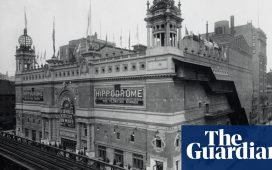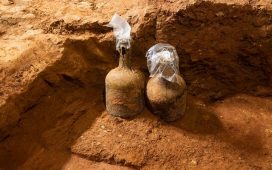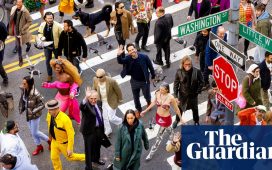Jan van Huysum, Flowers in a Terracotta Vase (1736-37) will be shown around the UK
The National Gallery in London is among the winners of an ambitious new art award funded by the European tech entrepreneur Frédéric Jousset, which will enable its curators to take a Dutch Golden Age masterpiece on tour around Britain. The Art Explora & Académie des Beaux-Arts European prize is one of a number of initiatives spearheaded by Jousset’s non-profit organisation Art Explora, which is backed by a €100m investment fund.
The €20,000 award will enable the National Gallery to tour a painting by the Dutch artist Jan van Huysum, Flowers in a Terracotta Vase (1736-37), to six “unusual” locations across the UK next year. The aim, says a statement, is to “promote well-being, especially among those affected by Covid-19”.
The other recipients of the inaugural award are first prize winners Mucem (Musée des civilisations de l’Europe et de la Méditerranée) in Marseille, which receives €80,000; second place goes to the Museo Nacional Thyssen-Bornemisza in Madrid (€50,000), while the National Gallery receives the third place prize.
Mucem (Musée des civilisations de l’Europe et de la Méditerranée) in Marseille won first prize of the inaugural Art Explora award
Mucem’s prize money will help fund a free bus bringing visitors from outlying areas to the museum while a social media initiative at the Thyssen-Bornemisza encourages younger viewers to reinterpret key words using the hashtag #VersionaThyssen. “There is an urgent need for culture to move out of its usual circles to reach all audiences,” Jousset tells The Art Newspaper. “[The award] is an invitation for museums to share ideas and best practices,” he adds. Jousset was on the award’s judging panel, alongside Henri Loyrette, former director of the Louvre.
Jousset believes that Art Explora’s initiatives can draw new audiences. The award is “based on the observation that the majority of Europeans do not go to museums—how can we solve this problem? You’re never more than an hour’s drive away from a theatre, festival or museum [in Europe]. Supply is everywhere. The problem is demand. How can we create this appetite for people in places like Yorkshire, Auvergne, in the suburbs of London and Paris where there is less exposure to art and culture?” he says.
The Van Huysum work could travel to places such as schools. “It is quite moving because it goes back to the story of the National Gallery during the Second World War [director Kenneth Clark decided to bring back one painting a month for display in the gallery in wartime London]. We are in a sort of wartime now against the virus. It’s emotional how history repeats itself,” Jousset adds. Next year, the Art Explora foundation will fund a mobile museum, organised in collaboration with the Centre Pompidou, which will tour Europe.
Another rupture is Brexit but UK institutions will continue to be eligible for the Art Explora & Académie des Beaux-Arts European prize. “The UK is leaving a customs union not Europe, geography trumps everything. Our deep cultural links and shared values supersede Brexit; artists may have a passport, but their talent should have no borders” Jousset says. Meanwhile, the Art Explora foundation is sponsoring an exhibition of works by the French street artist JR due to open at the Saatchi Gallery in London (28 January-11 April).
Jousset, the son of former Centre Pompidou curator Marie-Laure Jousset, is the founder of WebHelp—a tech support and outsourcing company that was valued at €2.4bn in 2019. He has since stepped down from the company and is promising an arts funding bonanza through the Art Explora foundation. The tech mogul also acquired the French art magazine Beaux-Arts in 2016.
A project statement outlines how Art Explora is financed, saying: “Every year, the first €100m investment fund in cultural and creative industries, ArtNova, will pay half of its profits into the capital of the second entity, Art Explora, endowed with €4m in inalienable capital, for financing a wide range of projects.”
Art Explora is a charitable trust, Jousset stresses. “Next year, we will be a charity in the public interest [known in France as une fondation reconnue d’utilité publique] which will involve appointing qualified trustees and independent advisors. Though I remain the main sponsor now, my financial contribution will be reduced as a percentage of the total money raised. I expect to lose majority in the governance of the fund.”
“This is a wake-up call to bring down some taboos and question long-established practices.”
Frédéric Jousset
The plan is to roll out the foundation project across Europe. “We will have parallel foundations in the UK and Switzerland to collect money locally in a tax efficient manner. I deliberately chose to name the foundation ArtExplora and not Jousset. It’s definitely not a personal project or an ego trip,” he insists. “The intention is to create something long lasting, global, and I hope it will one day be the equivalent of Greenpeace for arts and culture.”
His aim is to create a more sustainable model for cultural institutions, confronting “taboos” about how museums operate along the way. “The cultural world realised that being so dependent on tourism was a fragile way of operating. When we see the damage done to Venice and the queues in front of Mona Lisa—where you see 50 people Instagramming themselves in front of the painting—we have to ask what sort of experience is that? We want something more inclusive and sustainable for culture.”
The way you go to the Louvre today is comparable to going to the Louvre in 1900, Jousset argues. “In the case of French museums, public subsidies have been a shelter in the turmoil of Covid-19 and terrorism, but this hasn’t created an urge to innovate.” Jousset, who sits on the board of the Louvre, is advocating radical plans post-Covid for Western museums such as lending paintings to a mall, hotel or real estate projects for a fee.
He adds: “You’d not only gain new audiences but make some money that could support initiatives for democratising culture in challenged neighbourhoods. Could we imagine yield management [models] applied to ticketing? Perhaps change the lay-out to give museums more space for immersive technologies, attracting more youngsters? This is a wake-up call to bring down some taboos and question long-established practices.”









